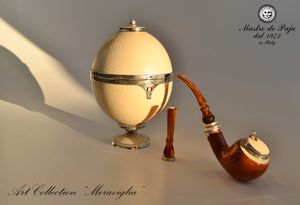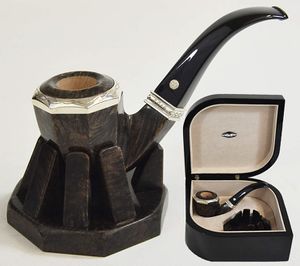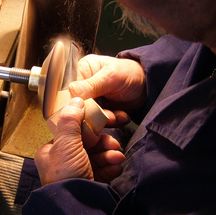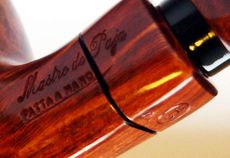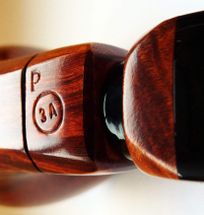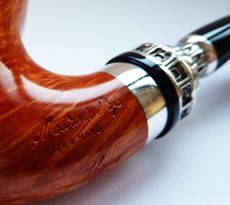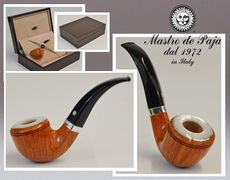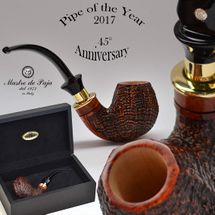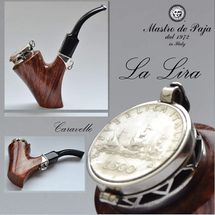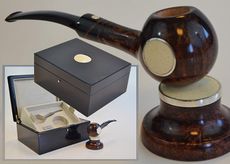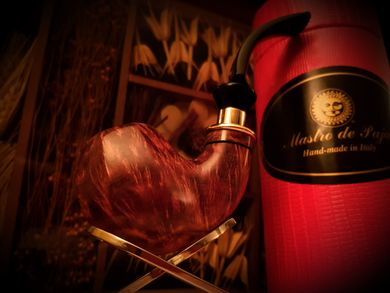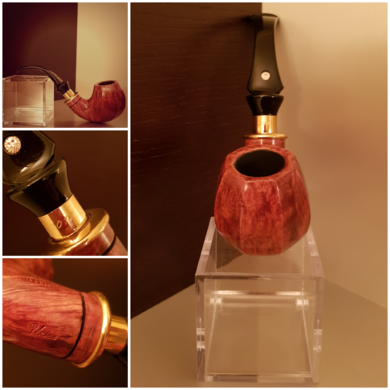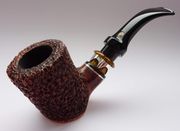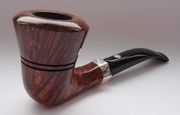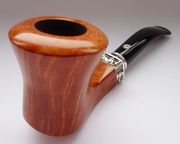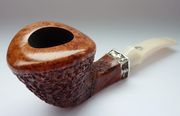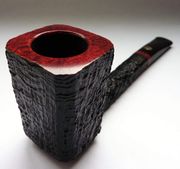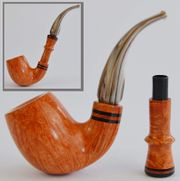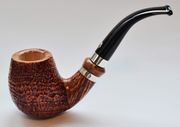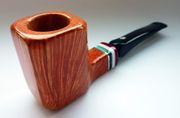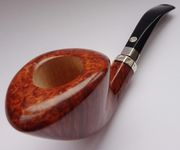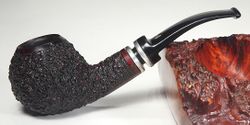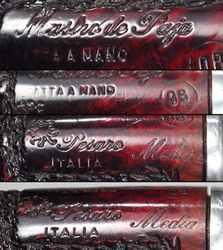Mastro de Paja: Difference between revisions
(New page: Article Courtesy of [http://www.smokingpipes.com/ Smokingpipes.com] left|thumb|Copyright Smokingpipes.com [[Image:Mastro de Paja Pipe02.jpg|right|thumb|...) |
No edit summary |
||
| (27 intermediate revisions by 8 users not shown) | |||
| Line 1: | Line 1: | ||
[[Image:ART (2).jpg|left|thumb|]] | |||
[[Image: | In 1972 Giancarlo Guidi, after having spent some time as a hobbyist in producing pipes, decided to officially found a production workshop called "Mastro de Paja". Mastro: obviously as a master craftsman, De Paja: it derives from the name with which he was affectionately called by friends "Pajetta" because of his curly hair and translated into a dialectal expression "de Paja". | ||
Spadoni Giannino joins him shortly after that, at the time he was a salesman and among the products he sold there were also pipes. A professional wedding that turned out to be perfect immediately, in no time the new company "MASTRO DE PAJA di Guidi e Spadoni" immediately became one of the most respected manufacturers of pipes in Italy for the quality of production and lines that for those times were innovative, fascinating and even if coarse they immediately met the consent of enthusiasts and collectors. | |||
Unfortunately, the professional marriage between Guidi and Spadoni, due to disagreements and different views on strategies, stopped in 1981. Guidi left the company to found a personal one. In Mastro de Paja which in the meantime became a real company with a production staff remains Spadoni. Unfortunately, after a very short time, due to economic and financial problems that put the possibility of continuing the business at risk, Spadoni is forced to ask for help and finds it with the intervention of the Pesaro-based entrepreneur Terenzio Cecchini who, despite being burdened by his multiple industrial activities, sees in Mastro de Paja a valid expression of high craftsmanship and takes over as majority shareholder and acquires the position of director. | |||
Mastro de Paja pipes | [[Image:ART (3).jpg|right|thumb|]] | ||
Soon after even Spadoni decides to leave (and create his own new company), Cecchini then puts his eyes on a very smart young man which he considered capable of giving new glaze to the mastro de paja which, meanwhile, inevitably presented some productive and commercial problems. That young man is called '''Alberto Montini''' and he start like this in his thirties his beautiful adventure in the pipes world. | |||
He lived in pesaro where he was also born, he is an accountant and he worked from 1978 to 1983 in a small company owned by his uncle, the company was just born and had a staff of five workers while he was the only employee, an handyman. when he left the job the company had thirty-five workers and five employees, in addition to him which was theirs manager. | |||
He was contacted by the surveyor Terenzio Cecchini at the time the only owner of the Mastro, to take care of it in every aspect, first as an employee, then as an administrator and later as a partner of Mastro de Paja and afterwards with the passing of Mr. Cecchini he became the sole owner. | |||
Living very intensely he started to learn the magical world of the pipes which became his great passion to which still today dedicates all of himself. | |||
On his entry into the Mastro he found a situation that he called catastrophic, 10 thousand pipes and one hundred percent or so of sales only in Italy. | |||
His first attempt was to reduce production to the benefit of quality and the care of each piece, then the decrease of sales points in Italy while at the same time looking for alternative markets. | |||
Today, unlike the past, almost all of the production is destined for the foreign market and its few examples are present in over 40 countries in the world, making its contribution to the made in Italy. | |||
Currently the Mastro produces about 2 thousand pipes a year with strictly artisan procedure, at the Mastro currently reigns a warm harmony, is a group of friends who strives to get the best. This also stems from the fact that pipes for Mastro de paja are not to be considered as any other object to be produced and sold following cold strategies common to everyone in the business world, it’s completely different, it is necessary to love it, it is a style of being, a philosophy of life that can only be appreciated by a noble soul and not noble by title but by principles. | |||
<gallery widths=230px heights=215px caption=""> | |||
File:LAVORAZIONE.jpg | |||
File:MARCHI_(1).jpg | |||
File:MARCHI_(2).jpg | |||
File:MARCHI_(3).jpg | |||
</gallery> | |||
The modeling of Mastro has not changed much over time, of course there is a continuous evolution for the better, determined also by the continuous research to make each piece as personalized as possible. Unique forms, that even if they are classic or classical, are capable of expressing personality. | |||
We can add looking at the past that this reason was one of the reasons for the unexpected and lightning success of the Pesaro brand, a worldwide success and it can be said that it is one of the most important and appreciated brands by pipe smokers and collectors from all over the world. | |||
Mastro de paja pipes are classified into 3 groups: | |||
- LIMITED EDITION | |||
- ELITE COLLECTION | |||
- CLASSICA COLLECTION | |||
Mastro de Paja "LIMITED EDITION" | |||
They are pipes produced in unique artistic specimens made for recurrences, numbered and limited edition productions. | |||
<gallery widths=230px heights=215px caption=""> | |||
File:ART (1).jpg | |||
File:ART (4).jpg | |||
File:ART (5).jpg | |||
File:ART (6).jpg | |||
</gallery> | |||
Mastro de Paja "ELITE COLLECTION" | |||
It is the production of pipes made entirely by hand, even they are unique but of regular production. | |||
On all "Mastro de Paja" pipes you can see fire stamped all the informations for tracing the value of each creation. | |||
[[File:Mastro 45° unica.jpg|thumb|390px|right||Mastro de Paja pipe of the year 2017, limited edition to celebrate 45° anniversary of the brand, awarded "Pipe of the year 2017" at Inter-Tabac (Dortmund) - Emanuele Mauro Collection]] | |||
[[File:Mastro 45° unica 10.png|thumb|390px|right||Mastro de Paja pipe of the year 2017, limited edition to celebrate 45° anniversary of the brand, awarded "Pipe of the year 2017" at Inter-Tabac (Dortmund) - Details - Emanuele Mauro Collection]] | |||
RUSTICATED | |||
* 0B: Completely rusticated | |||
* 0B Unica: Completely rusticated with some smooth sections | |||
SANDBLASTED | |||
* 1B: Dark brown or black sandblasted | |||
* 1B + 1 Sun: Light brown sandblasted | |||
PARTIALLY RUSTICATED | |||
* 2D: Smooth with small sections rusticated | |||
* 2D + 1 Sun: Smooth straight grain with small sections rusticated | |||
SMOOTH WITH COLORED FINISH | |||
* Ruber: Smooth with red stain | |||
* Castanea: Smooth with brown stain | |||
* 3A: Smooth with brown-orange stain | |||
* 3A + 1 Sun: Smooth good grain with brown-orange stain | |||
* 3A + 2 Sun: Smooth straight grain with brown-orange stain | |||
SMOOTH WITH NATURAL FINISH | |||
* 3B: Smooth with a good grain and a natural finish | |||
* 3B + 1 Sun: Smooth excellent grain with natural finish | |||
* 3B + 2 Sun: Perfect grain | |||
* 3C: Good grain | |||
* 3C + 1 Sun: Excellent grain | |||
* 3C + 2 Sun: Perfect grain | |||
* F: Straight grain | |||
* F + 1 Sun: Good straight grain | |||
* F + 2 Sun: Excellent straight grain | |||
* F + 3 Sun: Perfect straight grain | |||
Sometimes "Mastro de Paja Pipes" are enhanched with sterling silver, gold, precious stones and/or fine wood and are further classified and fire stamped on each pipe. | |||
* Stamp "P" : "Personal" with fine ornamentation. | |||
* Stamp "N" : "Normal" with basic sterling silver. | |||
* Stamp "L" : "Lavorata" with more complex sterling silver. | |||
* Stamp "S" : "Special" with elaborate sterling silver and specially worked. | |||
* Stamp "G" : "Gold" with special gold ornamentation. | |||
* Media : Medium size pipe | |||
* Gigante: Giant pipe | |||
<gallery widths=180px heights=215px caption=""> | |||
File:SINGOLE (1).jpg | |||
File:SINGOLE (2).jpg | |||
File:SINGOLE (3).jpg | |||
File:SINGOLE (4).jpg | |||
File:SINGOLE (5).jpg | |||
</gallery> | |||
Mastro de paja “CLASSICA COLLECTION” Pipes produced craft seeds, and for this reason there pipes have a very interesting value. | |||
Good combination of price and quality, of course using, as always the best quality of briar paying attention to the details and all personal decoration that make each pipe unique. | |||
<gallery widths=180px heights=215px caption=""> | |||
File:SINGOLE (6).jpg | |||
File:SINGOLE (7).jpg | |||
File:SINGOLE (8).jpg | |||
File:SINGOLE (9).jpg | |||
File:SINGOLE (10).jpg | |||
</gallery> | |||
<gallery widths=250 heights=250 caption="Example and nomenclature (Media, 0B, etc..) courtesy Doug Valitchka"> | |||
File:MastroDePaja01.jpg | |||
File:MastroDePaja07.jpg | |||
</gallery> | |||
<revive zone="7" align="right" caption="An excellent selection of Mastro de Paja pipes is available at Pipedia Underwriter, lepipe.it" /> | |||
'''Contact Information:''' | |||
Creazioni Italiane srl | |||
Via Fossombrone, 2 | |||
IT - 61121 Pesaro (PU) | |||
[mailto:info@mastrodepaja.it E-mail] | |||
[http://www.mastrodepaja.it/ Homepage] | |||
[[Category: Pipe makers by nationality]] | |||
[[Category: Italy]] | |||
Revision as of 17:22, 19 December 2020
In 1972 Giancarlo Guidi, after having spent some time as a hobbyist in producing pipes, decided to officially found a production workshop called "Mastro de Paja". Mastro: obviously as a master craftsman, De Paja: it derives from the name with which he was affectionately called by friends "Pajetta" because of his curly hair and translated into a dialectal expression "de Paja".
Spadoni Giannino joins him shortly after that, at the time he was a salesman and among the products he sold there were also pipes. A professional wedding that turned out to be perfect immediately, in no time the new company "MASTRO DE PAJA di Guidi e Spadoni" immediately became one of the most respected manufacturers of pipes in Italy for the quality of production and lines that for those times were innovative, fascinating and even if coarse they immediately met the consent of enthusiasts and collectors.
Unfortunately, the professional marriage between Guidi and Spadoni, due to disagreements and different views on strategies, stopped in 1981. Guidi left the company to found a personal one. In Mastro de Paja which in the meantime became a real company with a production staff remains Spadoni. Unfortunately, after a very short time, due to economic and financial problems that put the possibility of continuing the business at risk, Spadoni is forced to ask for help and finds it with the intervention of the Pesaro-based entrepreneur Terenzio Cecchini who, despite being burdened by his multiple industrial activities, sees in Mastro de Paja a valid expression of high craftsmanship and takes over as majority shareholder and acquires the position of director.
Soon after even Spadoni decides to leave (and create his own new company), Cecchini then puts his eyes on a very smart young man which he considered capable of giving new glaze to the mastro de paja which, meanwhile, inevitably presented some productive and commercial problems. That young man is called Alberto Montini and he start like this in his thirties his beautiful adventure in the pipes world.
He lived in pesaro where he was also born, he is an accountant and he worked from 1978 to 1983 in a small company owned by his uncle, the company was just born and had a staff of five workers while he was the only employee, an handyman. when he left the job the company had thirty-five workers and five employees, in addition to him which was theirs manager.
He was contacted by the surveyor Terenzio Cecchini at the time the only owner of the Mastro, to take care of it in every aspect, first as an employee, then as an administrator and later as a partner of Mastro de Paja and afterwards with the passing of Mr. Cecchini he became the sole owner.
Living very intensely he started to learn the magical world of the pipes which became his great passion to which still today dedicates all of himself. On his entry into the Mastro he found a situation that he called catastrophic, 10 thousand pipes and one hundred percent or so of sales only in Italy.
His first attempt was to reduce production to the benefit of quality and the care of each piece, then the decrease of sales points in Italy while at the same time looking for alternative markets.
Today, unlike the past, almost all of the production is destined for the foreign market and its few examples are present in over 40 countries in the world, making its contribution to the made in Italy.
Currently the Mastro produces about 2 thousand pipes a year with strictly artisan procedure, at the Mastro currently reigns a warm harmony, is a group of friends who strives to get the best. This also stems from the fact that pipes for Mastro de paja are not to be considered as any other object to be produced and sold following cold strategies common to everyone in the business world, it’s completely different, it is necessary to love it, it is a style of being, a philosophy of life that can only be appreciated by a noble soul and not noble by title but by principles.
The modeling of Mastro has not changed much over time, of course there is a continuous evolution for the better, determined also by the continuous research to make each piece as personalized as possible. Unique forms, that even if they are classic or classical, are capable of expressing personality. We can add looking at the past that this reason was one of the reasons for the unexpected and lightning success of the Pesaro brand, a worldwide success and it can be said that it is one of the most important and appreciated brands by pipe smokers and collectors from all over the world.
Mastro de paja pipes are classified into 3 groups: - LIMITED EDITION - ELITE COLLECTION - CLASSICA COLLECTION
Mastro de Paja "LIMITED EDITION"
They are pipes produced in unique artistic specimens made for recurrences, numbered and limited edition productions.
Mastro de Paja "ELITE COLLECTION"
It is the production of pipes made entirely by hand, even they are unique but of regular production.
On all "Mastro de Paja" pipes you can see fire stamped all the informations for tracing the value of each creation.
RUSTICATED
- 0B: Completely rusticated
- 0B Unica: Completely rusticated with some smooth sections
SANDBLASTED
- 1B: Dark brown or black sandblasted
- 1B + 1 Sun: Light brown sandblasted
PARTIALLY RUSTICATED
- 2D: Smooth with small sections rusticated
- 2D + 1 Sun: Smooth straight grain with small sections rusticated
SMOOTH WITH COLORED FINISH
- Ruber: Smooth with red stain
- Castanea: Smooth with brown stain
- 3A: Smooth with brown-orange stain
- 3A + 1 Sun: Smooth good grain with brown-orange stain
- 3A + 2 Sun: Smooth straight grain with brown-orange stain
SMOOTH WITH NATURAL FINISH
- 3B: Smooth with a good grain and a natural finish
- 3B + 1 Sun: Smooth excellent grain with natural finish
- 3B + 2 Sun: Perfect grain
- 3C: Good grain
- 3C + 1 Sun: Excellent grain
- 3C + 2 Sun: Perfect grain
- F: Straight grain
- F + 1 Sun: Good straight grain
- F + 2 Sun: Excellent straight grain
- F + 3 Sun: Perfect straight grain
Sometimes "Mastro de Paja Pipes" are enhanched with sterling silver, gold, precious stones and/or fine wood and are further classified and fire stamped on each pipe.
- Stamp "P" : "Personal" with fine ornamentation.
- Stamp "N" : "Normal" with basic sterling silver.
- Stamp "L" : "Lavorata" with more complex sterling silver.
- Stamp "S" : "Special" with elaborate sterling silver and specially worked.
- Stamp "G" : "Gold" with special gold ornamentation.
- Media : Medium size pipe
- Gigante: Giant pipe
Mastro de paja “CLASSICA COLLECTION” Pipes produced craft seeds, and for this reason there pipes have a very interesting value.
Good combination of price and quality, of course using, as always the best quality of briar paying attention to the details and all personal decoration that make each pipe unique.
- Example and nomenclature (Media, 0B, etc..) courtesy Doug Valitchka
Contact Information:
Creazioni Italiane srl Via Fossombrone, 2 IT - 61121 Pesaro (PU) E-mail Homepage
